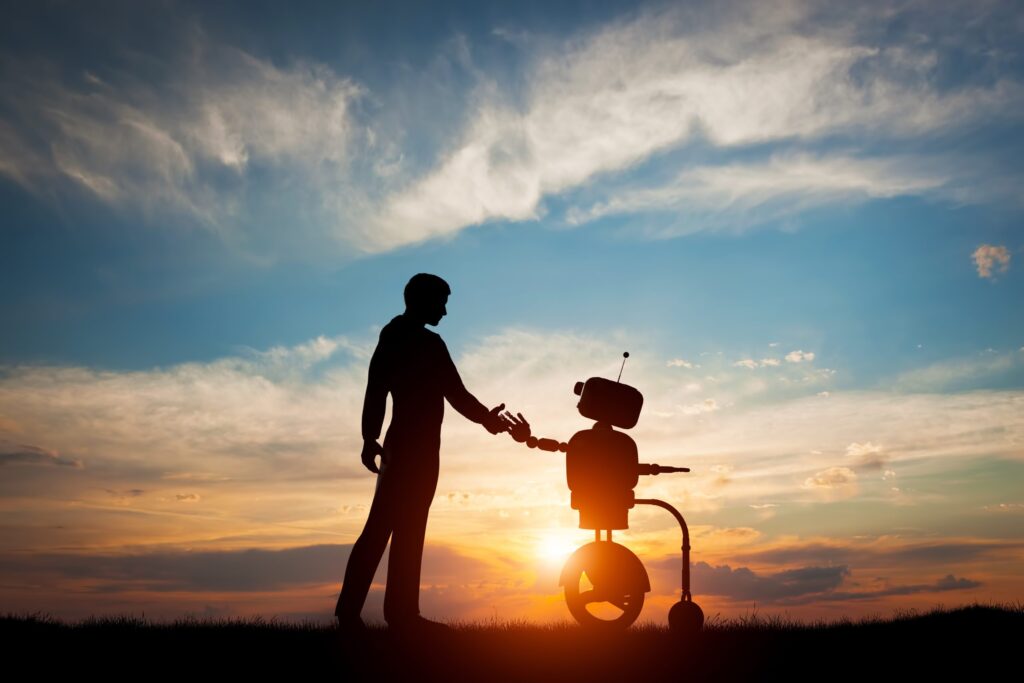May. 27, 2019

AI Potential & Shortcomings
We’ve all had at least some experience with artificial intelligence—and probably enough to be very aware of both its usefulness and its potential shortcomings.
The classic example is automated voice phone support: a customer service tool for gathering basic information, directing our inquiries to the appropriate department, and perhaps even providing us with the answer or solution that we require—all without ever speaking to an actual human being.
Similar yet more sophisticated AI applications include Apple’s virtual assistant, Siri; Google’s voice search feature, Ok Google; and various customer interaction chatbots, that imitate human conversations online.
When artificial intelligence applications work well, they can make our lives easier—by allowing us to access information quickly and complete tasks more efficiently.
But most of us have also experienced the frustration of being caught in a seemingly endless automated loop—when we have a question or concern that doesn’t fit neatly into the AI’s preprogrammed algorithm. Such situations can be ridiculously annoying, and point to one of the downsides of artificial intelligence—which is that no matter how sophisticated its programming is, AI will lack the capacity to handle at least some of our more unique and nuanced issues.
AI Is The Wave Of The Future
Is artificial intelligence a threat or a blessing?
Even with its shortcomings, artificial intelligence applications are rapidly increasing in both number and sophistication—and seem to be the wave of the future.
Estimates are that by the year 2020, a full 85% of consumer interactions will take place via fully-automated AI applications—i.e. in the absence of real-time connection with an actual human being 🙁 . AI has seeped into nearly every industry, and this trend has sparked conversations and debates regarding the role of humans in an increasingly automated future.
The interesting and vitally important questions that are raised tend to revolve around this central one: Is artificial intelligence a threat or a blessing? How much should we lean into the amazing capabilities of AI, and how much should we place controls on it today so we can harness it responsibly in the future?
This question will be a focal point for brands and technologists alike in 2019 and beyond.
Artificial Intelligence: Portrayals In Popular Culture
Not surprisingly, questions regarding the perks and downfalls of artificial intelligence emerge also as frequent topics in popular culture. Some you may already be familiar with include:

* In the sci-fi drama/romance movie Her, a man falls in love with his computer operating system: an interactive AI application whose almost-human qualities prove quite seductive. Questions that this intriguing scenario invite us to consider include: To what extent is such a relationship—between a human and artificial intelligence—healthy, and to what extent is it pathological? What about our relationship with our various e-devices? How are information, intelligence, and intimacy connected—if at all?
* In its thought-provoking episode The Measure of a Man, Star Trek TNG explores the requirements of sentience (e.g. intelligence, self-awareness) via a dispute around the status of the character Data: an android who serves as the second officer and chief operations officer aboard the Starship Enterprise. Is Data just an extraordinary piece of engineering and programming—a super-sophisticated AI application—or is he/it a sentient being? What’s the line between artificial intelligence and human intelligence?
The Double-Edged Sword Of Technology

In the hands of a skilled surgeon, a sharp blade—in the form of a scalpel—can save a life. In the hands of a criminal, a similarly sharp blade can violently end a life.
The science and technology of nuclear fission (the splitting of an atom) was used to design one of the most destructive weapons of all time: the atomic bomb. But this same technology has also been used to build nuclear power plants and generators—that have benefited our human cultures in a wide variety of ways.
And it would seem that AI—like any technology—is a double-edged sword. Used skillfully, these technologies can be harnessed to great benefit. But if used irresponsibly, the outcome could be damaging.
So now let’s take a closer look at some of the pros and cons of artificial intelligence, particularly in the realm of customer support.
Artificial Intelligence: The Pros
Let’s begin with some of the benefits of AI applications:
1. Reduction of errors. The automated algorithms that form the heart of an AI application are designed to minimize errors. The “oops” factor of silly human mishaps is pretty much eliminated.
2. Optimization of decision-making. By side-stepping, the mental and emotional fluctuations that all humans experience—and that can negatively affect clarity—an AI application can maximize the efficiency of decision-making. Particularly for simple basic queries, an AI application can be nearly perfect in its decision-making.
3. The ability to work 24/7. Unlike their human counterparts, AI applications don’t get tired, and can—at least in theory—work continuously. While humans require rest-time (and lunch-time!) to be efficient, an AI application can provide 24/7 customer support.
4. Reduction of wait-time for customers. An AI application can efficiently gather basic information—name, address, phone number, email, etc.—to streamline processes even if they also require human interaction.
5. Reduction of staffing costs. Installing an AI application may decrease the number of staff required to conduct your business.
6. The ability to work in risky or hard-to-reach terrain. Remotely controlled AI devices can be used to access environments that are too dangerous for humans: e.g. to the floor of a deep ocean to collect marine samples; or into a vehicle or room to defuse a bomb; or into the brain of a Parkinson’s patient to surgically implant healing electrodes.
Artificial Intelligence: The Cons
Now that we’ve reviewed the potential benefits of AI applications, here are some of the potential pitfalls:
1. AI can be expensive to implement. The combined cost of installation, maintenance, and repair of an AI application can be quite high—and, for some companies, prohibitive.
2. Our growing dependency on machines. If we depend upon machines to do more and more of our thinking for us, then—over time—our own cognitive capacities are likely to atrophy. Is this a path we really want to go down?
3. The replacement of humans with machines. With a growing number of low-skilled human jobs being taken over by AI applications, large-scale unemployment in certain work sectors is a likely outcome.
4. AI’s Limited scope of work. AI applications are limited by the algorithms that they operate on. They will never be able to think creatively (i.e. “out of the box”), adapt to new environments, or replicate the more nuanced aspects of human interaction. An AI application will never to be able to offer comfort or brainstorm an utterly unique solution to a sticky problem.
The Bottom Line
The potential benefits of having an AI assistant that is available to help 24/7—are obvious. And so the burgeoning interest in these technologies is not at all surprising—and they’re likely to be around for quite some time, continuing to grow in sophistication.
Whether these various AI technologies contribute to a utopian or a dystopian future depends upon us. If we can apply our human intelligence and moral compass skillfully to the choices that are forthcoming—helping us to implement protocols and controls that align with our heart-centered values—then AI technologies can support the healthy evolution of our human societies.
Questions or comments? Please feel free to contact us.
Book with us
Let’s accomplish what you are looking for, our team of experts are here for you.
Let's work togetherWarning: Working with our team may result in excessive creativity, uncontrollable 'aha' moments, and an addiction to perfect pixels. Please proceed with caution.



